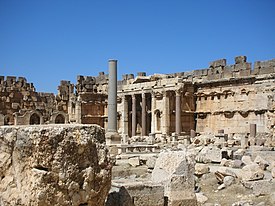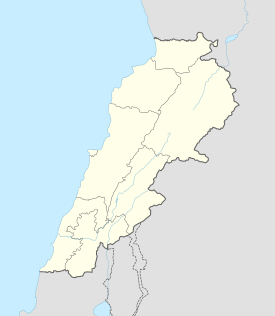
Back بعلبك Arabic بعلبك ARZ Baalbek AST Bəəlbək Azerbaijani Баальбек Byelorussian Баалбек Bulgarian বালবেক Bengali/Bangla Baalbek Catalan Baalbek (kapital sa lalawigan sa Lebanon) CEB Baalbek Czech
Baalbek
بَعْلَبَكّ | |
|---|---|
 | |
| Coordinates: 34°0′22.81″N 36°12′26.36″E / 34.0063361°N 36.2073222°E | |
| Country | |
| Governorate | Baalbek-Hermel |
| District | Baalbek |
| Government | |
| • Mayor | Bachir Khodr |
| Area | |
| • City | 7 km2 (3 sq mi) |
| • Metro | 16 km2 (6 sq mi) |
| Elevation | 1,170 m (3,840 ft) |
| Population | |
| • City | 82,608 |
| • Metro | 105,000 |
| Time zone | UTC+2 (EET) |
| • Summer (DST) | +3 |
| Criteria | Cultural: i, iv |
| Reference | 294 |
| Inscription | 1984 (8th Session) |
Baalbek[a] (/ˈbɑːlbɛk, ˈbeɪəlbɛk/;[5] Arabic: بَعْلَبَكّ, romanized: Baʿlabakk; Syriac-Aramaic: ܒܥܠܒܟ) is a city located east of the Litani River in Lebanon's Beqaa Valley, about 67 km (42 mi) northeast of Beirut. It is the capital of Baalbek-Hermel Governorate.[6] In 1998, Baalbek had a population of 82,608, mostly Shia Muslims, followed by Sunni Muslims and Christians.[7] The town is known for its historical sites and tourist attractions, including several ancient Roman temples, a Great Mosque from the Umayyad period, and a Roman quarry site named Hajar al-Hibla.[8]
Baalbek has a history that dates back at least 11,000 years, encompassing significant periods such as Prehistoric, Canaanite, Hellenistic, and Roman eras. After Alexander the Great conquered the city in 334 BCE, he renamed it Heliopolis (Ἡλιούπολις, Greek for "Sun City"). The city flourished under Roman rule. However, it underwent transformations during the Christianization period and the subsequent rise of Islam following the Arab conquest in the 7th century. In later periods, the city was sacked by the Mongols and faced a series of earthquakes, resulting in a decline in importance during the Ottoman and modern periods.[8] The city is known for the ruins of the Baalbek temple complex from the Roman period, housing two of the largest and grandest Roman temples: the Temple of Bacchus and the Temple of Jupiter. It was inscribed in 1984 as an UNESCO World Heritage site.
In the modern era, Baalbek is a relatively small city that enjoys economic advantages as a sought-after tourist destination. However, the tourism sector has encountered challenges due to conflicts in Lebanon, particularly the 1975–1990 civil war, and the ongoing Syrian civil war since 2011.[8] Today, the city is a stronghold of the militant organization Hezbollah.[9][10][11]
- ^ Cook's (1876).
- ^ Wood (1757).
- ^ EB (1878), p. 176.
- ^ إتحاد بلديات غربي بعلبك [West Baalbeck Municipalities Union] (in Arabic). 2013. Archived from the original on 23 July 2021. Retrieved 8 September 2015.
- ^
- Olausson, Lena (2 August 2006). "How to Say: Baalbek". London: BBC. Retrieved 8 September 2015.
- "Baalbek". Merriam–Webster. 2020.
- "Baalbek". American Heritage Dictionary of the English Language. Houghton Mifflin Harcourt Publishing Company. 2020.
- ^ "Mohafazah de Baalbek-Hermel". Localiban. Archived from the original on 21 February 2017. Retrieved 20 February 2017.
- ^ Wolfgang Gockel; Helga Bruns (1998). Syria – Lebanon (illustrated ed.). Hunter Publishing, Inc. p. 202. ISBN 9783886181056.
- ^ a b c Najem, Tom; Amore, Roy C.; Abu Khalil, As'ad (2021). Historical Dictionary of Lebanon. Historical Dictionaries of Asia, Oceania, and the Middle East (2nd ed.). Lanham Boulder New York London: Rowman & Littlefield. pp. 45–46. ISBN 978-1-5381-2043-9.
- ^ "Israeli Airstrike Hits Hezbollah Stronghold in Northeast Lebanon". Voice of America. 23 March 2024. Retrieved 27 May 2024.
- ^ "Israel conducts air raid on Baalbek, Hezbollah stronghold in Lebanon, sources say". Reuters. 23 April 2024.
- ^ Amun, Fadi; Hashmonai, Adi; Peleg, Bar (12 March 2024). "IDF strikes Hezbollah stronghold deep in Lebanon; 100 rockets fired at northern Israel". Haaretz. Retrieved 27 May 2024.
Cite error: There are <ref group=lower-alpha> tags or {{efn}} templates on this page, but the references will not show without a {{reflist|group=lower-alpha}} template or {{notelist}} template (see the help page).
© MMXXIII Rich X Search. We shall prevail. All rights reserved. Rich X Search
